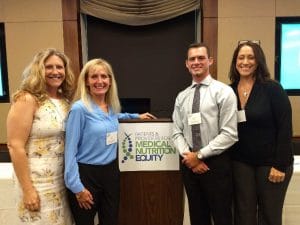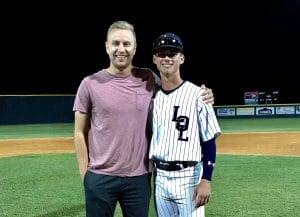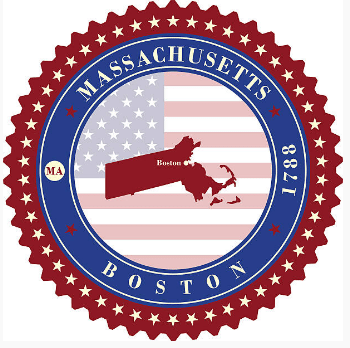 Remington Walls
Remington Walls After the family’s health insurance company stopped covering the 18-year-old’s nutritional formula in March 2017, they began the process of advocating for new legislation that would mandate all private health insurance plans and all federal health programs to provide coverage for medically necessary food.
Remington is among a small percentage of those with EoE who simply cannot tolerate eating any solid food. He sustains himself on a diet of 15 to 18 juice boxes a day of a hypoallergenic amino acid-based elemental formula. For 12 years, the family’s insurance company covered the formula, which costs $26,000 a year.
Then suddenly there was a change in the insurance coverage for the formula, which left the Pasco County, Florida family with a massive monthly bill, just so their son can feed himself. “We had a wrench thrown into our lives and we thought: how can we do something to change this?” Stephanie Walls told Allergic Living.
The family has since found some coverage for the formula costs. EoE sets off damaging inflammation in the esophagus when certain foods are consumed. For Remington, any food will cause his body to react and make him violently sick.
The Walls came to realize the “right to safe nutrition” issue was bigger than Remington’s needs. “We knew we had to have some legislation in place to protect, not just our family, but others too,” says this mother. “To cost $26,000 a year just to feed someone, that’s insane. And there are many families that can’t maintain that on a regular basis.”
Need for Law: “How Am I Supposed to Live on Water”
The Walls got busy. Throughout 2017, they learned about what goes into creating legislation and worked with lawmakers on a state bill in Florida, which has yet to pass. Then they began to work with the non-profit American Partnership for Eosinophilic Disorders (APFED) on moving forward a federal law. APFED and other non-profit health groups were already working on the proposed Medical Nutrition Equity Act of 2017. The bipartisan legislation would mandate coverage for medically necessary foods for those with digestive and metabolic conditions ranging from EoE to FPIES, Crohn’s and more.
 From left: Mary Jo Strobel of APFED, Stephanie Walls, Remington Walls and Beth Allen, founder of APFED, in Washington, D.C.
From left: Mary Jo Strobel of APFED, Stephanie Walls, Remington Walls and Beth Allen, founder of APFED, in Washington, D.C. “I was trying to get them to understand what it’s like living without food and that elemental formula is not a supplement,” Remington told Allergic Living. “Supplements are added to someone’s diet. For me, if you take away my ‘supplement’ then all I’m left with is water. How am I supposed to live on just water?” The teen drove home that point during his talk, saying it was a “matter of life.”
The bill now has 36 Congressional co-sponsors. APFED and the Patients & Providers for Medical Nutrition Equity Coalition, representing other affected diseases, are asking the public to lobby their representatives to support the Medical Nutrition Equity Act. Mary Jo Strobel, executive director of APFED, says her group and the Walls are looking forward “to working with the bill champions to move MNEA forward in 2019.”
Several states have passed legislation to ensure insurance coverage of medical foods, “but there is no federal legislation that provides uniform and consistent coverage to all Americans who need it,” said Strobel. “As a result, many families shoulder a large financial burden.”
Inspirational Book and Resolve to Live a Full Life
Remington is not one to let his challenging food allergies hold him back. The teen finished his senior year in high school as a standout baseball player and Remington
 Remington with his friend, pastor Chris Dotson.
Remington with his friend, pastor Chris Dotson. Remington jumped at the opportunity to work on the book in the summer, before moving away to college. “I hope that people are inspired by it,” he says.
The book details Remington’s life with EoE, how he surmounted obstacles as a child to live a seemingly normal life – even though he could not eat solid foods like every other kid. Today, the teen maintains an active lifestyle despite EoE – he is studying at Valdosta State University, living in a dorm, taking a full schedule of classes, followed by three hours of baseball practice every day. Remington has a federal 504 Plan for disability accommodations, since he requires extra dorm space to store about 15 cases of his formula, as well as a bigger refrigerator.
With the book, the Walls family is proving that even with a severe form of a food allergy, with determination and hard work, anything you put your mind to is possible. “I can still live a normal life,” says Remington. “I want people to see that regardless of obstacles in their own lives, they too can overcome. They just have to believe, surround themselves with positivity and never give up.”
To help support this legislation, click here.





